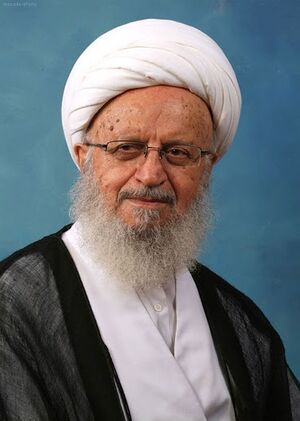Draft:Naser Makarem Shirazi
| Naser Makarem Shirazi | |
|---|---|
 | |
| name | Naser Makarem Shirazi |
| other names | Grand Ayatollah Naser Makarem Shirazi |
| Personal details | |
| brith year | 1927 AD - 1305 SH - 1345 HA |
| birth place | Shiraz, Iran |
| brith date | 25 February |
| teachers | Ayatollah Muhammad Hussein Burujerdi |
| religion | Islam |
| faith | Shīʿā |
| works | Twelver Shīʿā |
| known for | Fiqh, Kalam and Tafsir |
| website | makarem.ir |
Naser Makarem Shirazi (Persian: ناصر مکارم شیرازی, born 25 February 1927 in Shiraz, Iran) is an Iranian Shia marja' and religious leader.
Biography
He was born in the city of Shiraz, Iran. According to his website, his father was Ali Mohammad, his grandfather was Mohammad Karim, his forefather was Mohammad Baqer, and his progenitor was Mohammad Sadeq.He finished his school in Shiraz
He started formal Islamic studies at 14 in the Agha Babakhan Shirazi seminary. After completing the introductory studies, he studied jurisprudence (fiqh) and its principles (usool al-fiqh).
He made rapid progress and finished studying the introductory and intermediate Islamic studies levels in approximately four years. During this time, he also taught at the Islamic seminary in Shiraz.
At the age of 18, he formally entered the theological seminary of Qom, and for the next five years, was present in the religious gatherings and classes of some of the leading Islamic teachers of those days, such as Ayatollah Muhammad Hussein Burujerdi, & Ayatollah Seyyed Kazem Shariatmadari.
Najaf
In 1950, he made his way to the seminary of Najaf, Iraq. Here, he was able to take part in classes of teachers such as Ayatollah Muhsin al-Hakim, Ayatollah Abul-Qassim Khoei and Ayatollah Abdul Hadi ash-Shirazi.
At 24, two senior scholars in Najaf granted him complete ijtihad. Ayatollah Muhsin al-Hakim also wrote a short, comprehensive letter of commendation for him.
After returning to Iran, Ayatollah Naser Makarem Shirazi began teaching the intermediate and higher level of studies in usul al-fiqh and fiqh.
He has won the Iranian Royal Academy of Philosophy award for his essay "Filsuf-Namah [1]